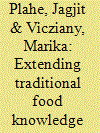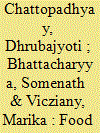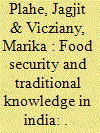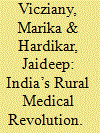|
|
|
Sort Order |
|
|
|
Items / Page
|
|
|
|
|
|
|
| Srl | Item |
| 1 |
ID:
154560


|
|
|
|
|
| Summary/Abstract |
Small farmers, who are normally dependent on marketing intermediaries, have formed themselves into co-operatives in the Indian states of Telangana, Andhra Pradesh and Maharashtra and have started to sell their produce directly to consumers via retail outlets, the Internet, urban franchises, mobile vans, rural food hubs and as branded products. The key engine for this marketing experiment is the Sahaja Aharam Producer Company Limited (SAPCO), a producer organisation. SAPCO has tried to create new supply chains that guarantee that the produce it sells complies with the quality standards needed to certify the foods as ‘organic’. SAPCO is an initiative of the Centre for Sustainable Agriculture (CSA) which has taken up the bulk of the financial and administrative burden of managing the company. The revival of traditional knowledge for organic farming and the marketing of organic produce has invariably required the intervention of external agents such as CSA. In the final section, we assess the achievements of SAPCO from the viewpoint of the small farmers who belong to the producer co-operatives that make up SAPCO's membership. Our key research question is whether it has been possible to scale up the production and marketing of small farmers’ output and create a new supply chain independent of local intermediaries.
|
|
|
|
|
|
|
|
|
|
|
|
|
|
|
|
| 2 |
ID:
154559


|
|
|
|
|
| Summary/Abstract |
This multi-disciplinary paper brings together two bodies of evidence that, to our knowledge, have not before been combined: literature about the efficient functioning of the East Kolkata Wetlands in the production of fish is juxtaposed against scientific research that documents the heavy metal pollution of those Wetlands caused by industries such as tanneries. Our primary question is whether it is safe to eat the fish (and other produce) of the Wetlands; a related issue is to assess the strengths and limitations of traditional knowledge. In discussing what the farmers know and what the scientists know, we have placed our work in the context of a framework developed by Richards in 1979. Our conclusions suggest that the expertise of the farmers and the expertise of the scientists can be brought together.
|
|
|
|
|
|
|
|
|
|
|
|
|
|
|
|
| 3 |
ID:
154555


|
|
|
|
|
| Summary/Abstract |
In this first paper, we explain why traditional knowledge is an important theme in the study of Indian agriculture, especially given the crises routinely facing poor, smallholder farmers. We begin with an overview of some of the key authors who have written about the problems facing small farmers both within and outside India. Different authors have focused on different aspects of the benefits that can be derived from the local knowledge and skills of farmers, but these do not always pertain to organic farming. Our interest in organic farming is specifically about ‘traditional’ knowledge. With the industrialisation of agriculture in India and elsewhere, many poor, small farmers have been deskilled and placed into vulnerable positions. Traditional knowledge has been undermined, overwhelmed or has survived only in fragments. How ‘traditional knowledge’ might be retrieved, reinvented, reintroduced and modified so as to create a farmer-driven, sustainable and biodiverse agriculture is our concern. In the final section of this paper, we analyse the four situations we have been working on as examples of the possibilities and challenges facing the revival of ‘traditional knowledge’ in the villages of Kolkata, central India and Sikkim.
|
|
|
|
|
|
|
|
|
|
|
|
|
|
|
|
| 4 |
ID:
182855


|
|
|
|
|
| Summary/Abstract |
This article explores the potential conflict between allopathic (‘Western’) medicine and rural beliefs in village goddesses, given that each demands blood for diagnostic purposes and sacrifices, respectively. Our objective is to understand the experiences and attitudes of rural residents to blood tests, blood donations and blood transfusions. We explore the specific question of the extent to which poor villagers in Wardha district, Maharashtra, might be supportive of or opposed to point-of-care blood testing at their doorsteps. We began by asking them about their religious practices, including the sacrifice of animals and offerings of blood to deities. Such values could affect their perspectives on human blood and allopathic medicine. After that, we asked whether they had any fears about modern medical treatments and technologies—such fears might be driven by anxieties about angering goddesses if human blood was used for non-sacred purposes. Our investigations took us into an inquiry about villagers’ experiences with hospitals. We came to realise that for villagers, despite the costs of hospital diagnosis and treatment, hospitalisation had become a source of new knowledge about blood. And, finally, we asked villagers what they thought about the value of point-of-care blood testing at their doorstep. We were told that the high cost of hospital treatment means that villagers support technologies that can be used at their doorstep and work towards improving their health and longevity.
|
|
|
|
|
|
|
|
|
|
|
|
|
|
|
|
| 5 |
ID:
066003


|
|
|
| 6 |
ID:
182853


|
|
|
|
|
| Summary/Abstract |
The disease burden in South Asia is complex and multifaceted: old, new, re-emerging and newly recognised conditions all coexist and interact in ways that we have yet to fully understand. The characteristics of COVID-19 have stressed these comorbidities. A discussion on longevity and the theory of epidemiological transition is followed by an analysis of the Indian experience with infectious and non-infectious diseases, injuries and inflammatory conditions, as an illustration of what has been happening in South Asia more generally. These conditions are not hermetically sealed from each other with comorbidities frequently the cause of death even if the official data does not reveal this. In the final part of this essay, the significance of the research findings in the other five papers that comprise this collection are discussed: these deal with the role of hospitals, new diagnostic and drug technologies and the question of ‘elite capture’ as an explanation for the high cost of medical care for the poor. The collection presents case studies from India, Pakistan and Bangladesh. Our collective approach has been to see the disease burden and health-care responses through a political economy of death and disease, and to link that with insights from ethnographic research and case studies.
|
|
|
|
|
|
|
|
|
|
|
|
|
|
|
|
| 7 |
ID:
089385


|
|
|
|
|
| Publication |
2009.
|
| Summary/Abstract |
Mumba-devi- is the patron Goddess of the city of Mumbai, one of the largest and most cosmopolitan cities of Asia. Local traditions say that Mumba-devi- was a Koxs1E37i- Goddess and worshipped by the indigenous Koxs1E37i- fisher community for centuries. However, since the turn of the twentieth century the temple of Mumba-devi- and the rituals surrounding the Goddess have gradually been Sanskritised. Today, Mumba-devi- is more closely associated with the Gujarati community. This paper examines this transformation and in doing so reflects on the survival of Mumba-devi-, the ongoing popularity of Goddess worship in Mumbai and the failure of Hindu fundamentalists to subordinate the Mother Goddesses of Mumbai to a more limited range of Hindu Gods.
|
|
|
|
|
|
|
|
|
|
|
|
|
|
|
|
| 8 |
ID:
061094


|
|
|
| 9 |
ID:
057109


|
|
|
| 10 |
ID:
057114


|
|
|
| 11 |
ID:
077156


|
|
|
|
|
|
|
|